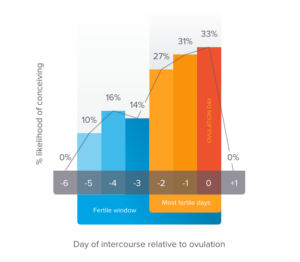As with all mind and body matters, a patient’s overall health greatly affects their fertility. Patients can naturally optimize their fertility by addressing and correcting health issues such as menstrual cycle irregularities, hormonal imbalance and low cervical mucus. Patients can also improve conception chances by adhering to a fertility window and adopting a healthy lifestyle.
Menstrual cycle irregularities
Ovulation can be thwarted or delayed by cycle irregularities such as amenorrhea, the absence of menstrual periods and dysmenorrhea, painful menstrual periods. Both are often symptoms of underlying issues that can cause infertility such as hormonal imbalance, endometriosis and uterine fibroids. Natural treatments for menstrual cycle irregularities include dietary changes, stress reduction and maybe even reduction in exercise.
Hormonal Imbalances
PCOS
One of the leading causes of infertility in women is Polycystic Ovarian Syndrome (PCOS), a hormonal imbalance that causes insulin resistance and negatively impacts ovulation. PCOS affects levels of testosterone, estrogen, luteinizing hormone (LH) and follicle-stimulating hormone (FSH) which all play a major role in conception. When these hormones are not properly balanced there is a disruption in fertility. Many women with PCOS have found supplementing their diet with vitamins such as Inositol to be a very effective natural treatment to improve ovulation. Inositol is a nutrient that is made by the body and also found in some whole foods such as grains, nuts, beans and fruits. Studies have shown that Inositol promotes normal hormone levels and improves how the body uses insulin.
Hypothyroidism
Our thyroid plays a major role in many of our systems including our reproductive system. Hypothyroidism is when the thyroid produces too little hormone including those necessary for reproduction. According to the American Society for Reproductive Medicine (ASRM), overt hypothyroidism can cause increased infertility, miscarriage and adverse fetal outcomes. Changes in diet have been shown to help the thyroid function more normally.
Cervical mucus
Healthy cervical mucus is a pivotal component to achieving pregnancy. Factors contributing to an insufficient amount of cervical mucus are age, hormonal imbalances, medication use, douching and being under or overweight. Hormonal imbalances can be corrected with estrogen supplements taken in conjunction with fertility drugs such as clomid, decreasing stress by means of exercise, massage or meditation and by adjusting one’s diet to include more estrogen boosting foods. These foods include but are not limited to flaxseeds, strawberries, peaches, yams, carrots, chickpeas dark rye bread, olives and olive oil. Vaginal douching can wash away valuable cervical mucus, while also washing away good bacteria. Leading to an increased risk of vaginal infection, another culprit known to negatively impact the mucus. In short, it’s best to skip vaginal douching or products meant as “feminine deodorants.”
Lifestyle management
The American Society for Reproductive Medicine (ASRM) reports that fertility is decreased in women who are very thin or obese. However, there is no evidence that normal diet variations affect women who are normal weight and having regular periods.
Eat Well
Eating certain foods and avoiding others is something that can help improve ovulatory function.
Fuel up on:
- Whole grains to gain fiber, vitamin E & vitamin B
- Fruits, vegetables to gain vitamin C & antioxidants
- Lean meats, beans to gain protein, zinc, iron
- Low-fat dairy to gain protein, calcium
Other lifestyle choices including smoking, heavy alcohol consumption of more than 2 drinks per day, heavy caffeine consumption and the use of recreational drugs such as marijuana have all been associated with reduced fertility. Therefore, women and male partners considering pregnancy should reduce alcohol and caffeine use; avoid smoking and all recreational drugs while trying to conceive.
Try to avoid:
- Alcohol
- Sugar, soda & pasteurized juices
- Energy drinks
- Raw fish & fish with high mercury content
Exercise
Regular, moderate exercise is beneficial for overall health and well being. Recommendations include:
- Walking
- Dancing
- Cycling
- Swimming
- Yoga and Pilates
Those who are looking to become pregnant should avoid higher intensity workouts as they tend to work against fertility, rather than help it.
The Fertile Window
Having intercourse at the right time, during the “fertile window” of a woman’s menstrual cycle, is the only time when pregnancy can occur. Keep in mind that this window will vary depending on the woman’s individual cycle. Timing intercourse in the six days leading up and including ovulation is the window with highest chance of conception. This window reflects the lifespan on sperm which is five days and the lifespan of the ovum which is twenty-four hours. Helpful methods of working out when ovulation is about to occur is monitoring changes in vaginal mucus, using ovulation predictor kits, recording the basal body temperature (BBT) and using ovulation calculators online.
The three days leading up to and including ovulation are the most fertile. As the chart shows, if a woman has sex on any of these three days, she has a 27-33% chance of becoming pregnant.
Chart: Adapted from data by Wilcox, A.J. et al. NEJM (1995) 333:1517

Sources:
https://yourfertility.org.au/for-women/timing-and-conception/
https://www.parents.com/getting-pregnant/fertility/boost/ways-to-boost-your-fertility/